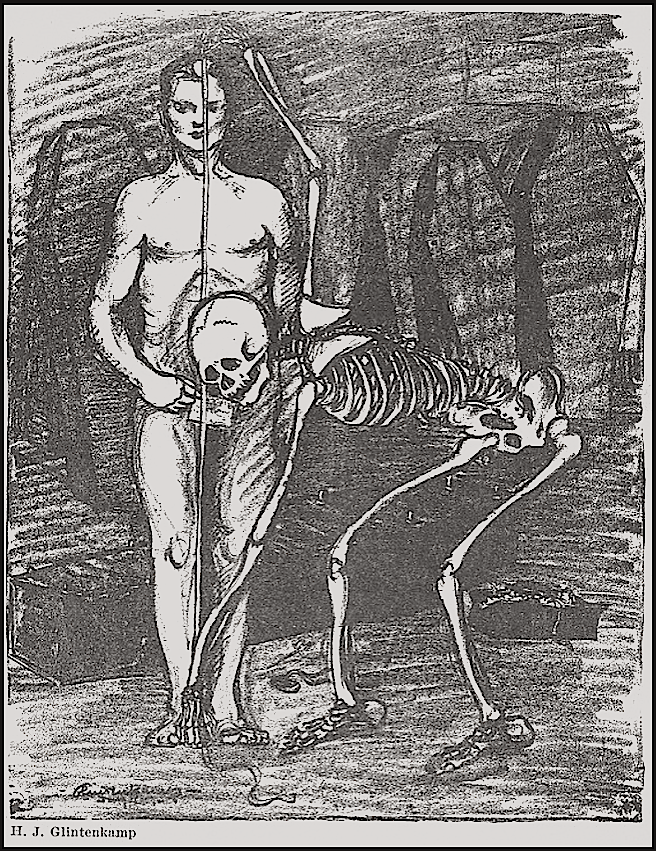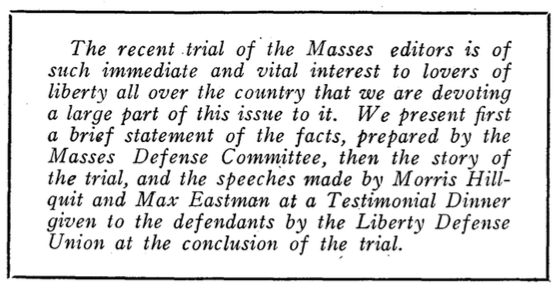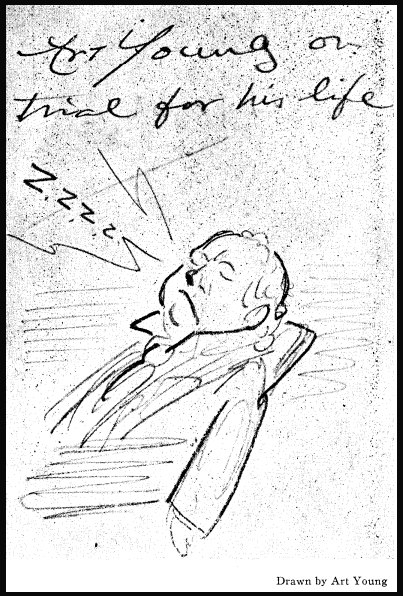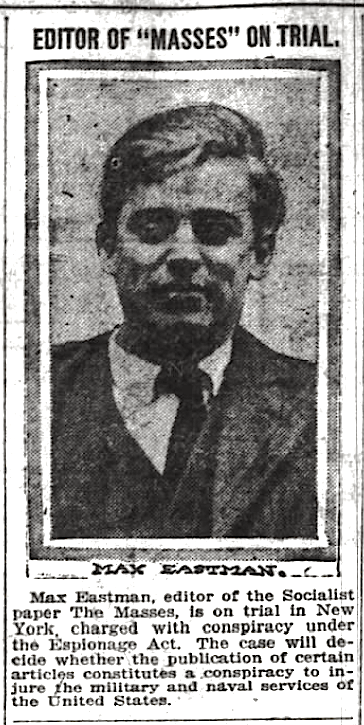People who demand neutrality
in any situation
are usually not neutral
but in favor of the status quo.
-Max Eastman
~~~~~~~~~~~~~~~~~~~~~~~~~~~~~~~~~~~~~~~~~~~~
Hellraisers Journal, Tuesday June 4, 1918
New York, New York – Retrial of Masses Editors Expect
From The Liberator of June 1918:
The Masses Case
THE prosecution of the editors of The Masses for “conspiracy to obstruct recruiting and enlistment” is an attack on the lawful freedom of the press.
It is not an attempt to defend the country against conspirators, spies, or any other classes of criminals contemplated by those who framed the espionage law.
It is an attempt to put four American citizens in jail for expressing their lawful opinions. And it is the culmination of a series of acts which the New York Evening Post has described as “governmental persecution.”
Not one word of evidence to prove that these men ever wrote to each other, or ever discussed the subject of the draft or enlistment with each other, after the passage of the espionage law, was adduced by the government.
Not a word of direct evidence that they intended to, or wanted to, or ever even imagined or discussed the possibility that they might obstruct recruiting or enlistment.
No pretense that they ever made an attempt to reach with their magazine men of draft age or men eligible for enlistment.
No pretense that anybody was ever deterred by them from enlisting or registering under the law.
No pretense that they ever received a cent of German or pro-German money, or that they had any pro-German friends or connections, or anything but hatred for German militarism and the German imperial government.
* * *
The prosecution’s evidence of conspiracy consisted solely of the open publication by these men of their opinions about the war and about the principle of conscription, and the rights of conscientious objectors, in a magazine which they owned and published without profit for the sake of individual expression.
In addition to the August, September and October issues of this magazine the government produced a telegram and a few letters written individually by two of the defendants to persons in no way connected with the case and before the espionage law was passed, in which similar opinions were expressed-none of them addressed to prospective soldiers, none of them advising against enlistment or registration. In not one of these letters was there a statement of opposition to the war or to conscription as vigorous as those openly published in the magazine.
The prosecution adduced two issues of The Masses that were written, printed and distributed before the espionage law was passed, and every extreme statement of opposition to war and to conscription in those issues was diligently and repeatedly read to the jury as of equal import with those published after the law was passed.
Upon such evidence, the bulk of it relating to facts ante-dating the passage of the law under which the defendants were indicted, and none of it proving an intent to obstruct recruiting or enlistment, and none of it even tending to prove a conspiracy, or any kind of a plan or arrangement among the defendants, the government is attempting, by working upon the wartime prejudice and excitement of a jury, to send these American citizens to prison.
* * *
The defense established by uncontradicted testimony the following facts, not only proving that there was no conspiracy and no intent to violate the law, but proving that every effort was made by the defendants to secure a definition of the law, and confine their expressions of opinion to it:
(1) The business manager took one of the issues adduced by the prosecution to George Creel, who was then supposed to be the national censor, in order to make sure that there was nothing unlawful in it. Creel himself testified that he understood this to be the purport of the visit, and that he had said it contained nothing in violation of the law, so far as he knew.
(2) The editors of The Masses never held a meeting or any conference to plan out a future issue of The Masses during the time described in the indictment. Art Young was in Washington practically the whole time. Max Eastman was absent from the office almost continually. The magazine was made up, as usually in the summer months, by Floyd Dell or his assistant, from the material voluntarily submitted by the contributing editors.
(3) No committee with authority to reject contributions from the contributing editors and owners of the magazine was present during this time, and no such contribution was rejected.
(4) The defendants themselves first brought this case into the courts. In July, exactly when the alleged conspiracy would have been at its height, they went before Judge Learned Hand and asked for an injunction compelling the Post Office to admit their August issue into the mail.
(5) The injunction was granted and although it was stayed by an appeal on the part of the Post Office, it was under the influence of this judicial decision in their favor that the defendants brought out the other two issues cited in the indictment.
(6) After the suppression of the August number The Masses Publishing Company wrote to the Post Office Department asking for specific rulings on the things contained in their magazine so that they could make up future magazines in compliance with the Post Master General’s interpretation of the law. These requests were frequently repeated, and never answered in any way by the department at Washington.
(7) In September Max Eastman brought the matter to the attention of the President, so confident was he that his expression of opinions had not violated any law, and he received a cordial letter from the President in reply.
(8) In October Max Eastman, in company with E. W. Scripps, the head of the United Press Association, called upon the Post Master General, to make application for a new mailing privilege, and received from him the promise of a reply within a week. He never received any reply, and from that day to this his letters and telegrams to the Post Office Department at Washington have been absolutely ignored.
These facts, proving that there was no conspiracy and no unlawful intent, were established by the defense without contradiction-in opposition to the prosecution’s case in which no evidence of conspiracy or unlawful intent beyond the mere individual publication of opinions was adduced.
* * *
After a trial lasting two weeks, in a room whose windows opened upon a liberty bond booth where patriotic airs were played by a brass band for several hours every day, and in which every device of patriotic argument and emotion was employed, and in which practically everything the defendants had said since and even before the war was declared was admitted, while the defendants made no apology for their opinions, but conceded and re-read all that they had written, the jury, which was kept out two nights and a day and a half, failed to agree on a verdict.
It is the opinion of every impartial person that such a disagreement in times like these, and in the face of a violent newspaper propaganda for conviction, was a victory and vindication of the defendants. Nevertheless the government has moved for an immediate retrial.
* * *
Justice and liberty are on the side of these defendants and we, urge you to give them whatever support you can. In defending them we shall be defending a vitally important public principle,-the maintenance of constitutional rights in war-time. The free-press issue is more clearly presented in this case than in any brought into court since the war began. Lawyers for the prosecution as well as lawyers for the defense declare it to be the most important case before the country today.
Issued by the
MASSES DEFENSE COMMITTEE
Amos Pinchot, Treasurer
101 Park Avenue, New York[Drawing by Art Young is from “The Story of the Trial” by Floyd Dell-The Liberator, June 1918. Photograph of Max Eastman is from Buffalo Enquirer, April 18, 1918]
From The Masses of October 1917:
“Measured for Death” by H. J. Glintenkamp

~~~~~~~~~~~~~~~~~~~~~~
SOURCE
The Liberator
(New York, New York)
-June 1918
https://www.marxists.org/history/usa/culture/pubs/liberator/1918/04/v1n04-jun-1918-liberator.pdf
IMAGES
Art Young, 1st Masses Trial, Liberator p11, June 1918
https://www.marxists.org/history/usa/culture/pubs/liberator/1918/04/v1n04-jun-1918-liberator.pdf
Masses 1st Trial, Max Eastman, Bff Enq p4, Apr 18, 1918
https://www.newspapers.com/image/326168544/
WWI, Measured for Death & Physically Fit by Glintenkamp, Masses Oct 1917
http://dlib.nyu.edu/themasses/books/masses078/11
See also:
The Masses, First Trial
-April 1918
https://en.wikipedia.org/wiki/The_Masses#First_Trial
The Masses, 1911-1917
-to view actual copies
http://dlib.nyu.edu/themasses/frontpage
The Masses, August 1917
http://dlib.nyu.edu/themasses/books/masses076
The Masses, September 1917
http://dlib.nyu.edu/themasses/books/masses077
The Masses, October 1917
http://dlib.nyu.edu/themasses/books/masses078
The Masses, 1911-1917
https://www.marxists.org/history/usa/pubs/masses/index.htm
https://en.wikipedia.org/wiki/The_Masses
http://spartacus-educational.com/ARTmasses.htm
From Spartacus Educational:
After the USA declared war on the Central Powers in 1917, The Masses came under government pressure to change its policy [re stand taken against U. S. entry into WWI]. When it refused to do this, the journal lost its mailing privileges. In July, 1917, it was claimed by the authorities that articles by Floyd Dell and Max Eastman and cartoons by Art Young, Boardman Robinson and Henry J. Glintenkamp had violated the Espionage Act…
Henry J. Glintenkamp fled the country for Mexico but the others stood trial in April, 1918 [first trial]. Floyd Dell argued in court: “There are some laws that the individual feels he cannot obey, and he will suffer any punishment, even that of death, rather than recognize them as having authority over him. This fundamental stubbornness of the free soul, against which all the powers of the state are helpless, constitutes a conscious objection, whatever its sources may be in political or social opinion.” The legal action that followed forced The Masses to cease publication. After three days of deliberation, the jury failed to agree on the guilt of Dell and his fellow defendants.
The Liberator, 1918-1924
-about & to view actual copies
https://www.marxists.org/history/usa/culture/pubs/liberator/
The Liberator, 1918-1924
-about
https://en.wikipedia.org/wiki/The_Liberator_(magazine)
http://spartacus-educational.com/Jliberator.htm
~~~~~~~~~~~~~~~~~~~~~~~~~~~~~~~~~~~~~~~~~~~~



